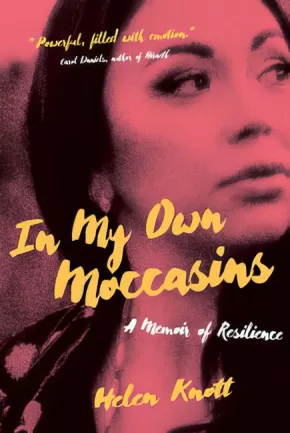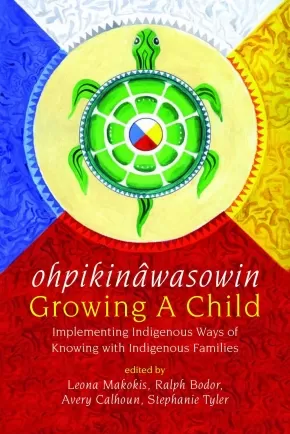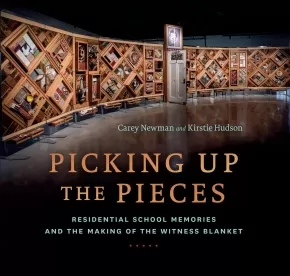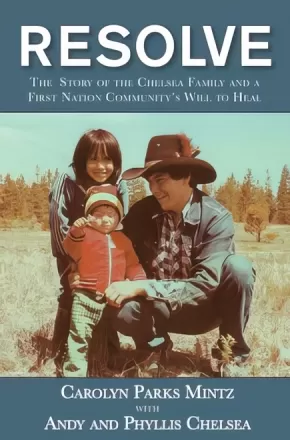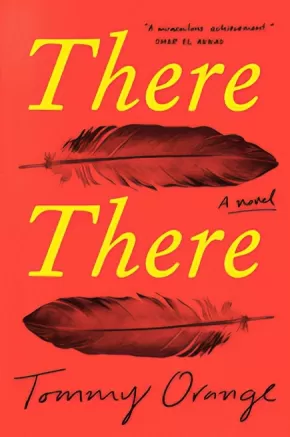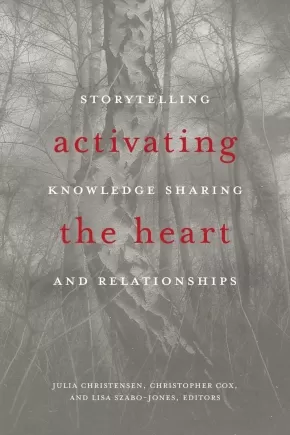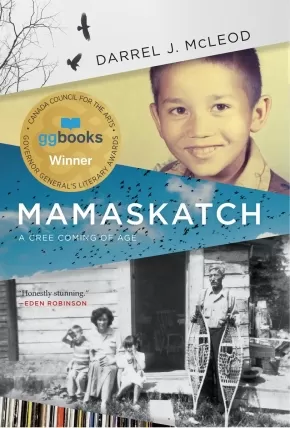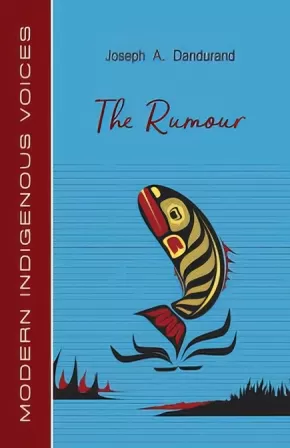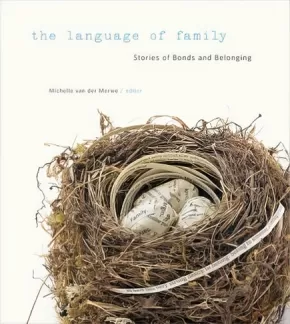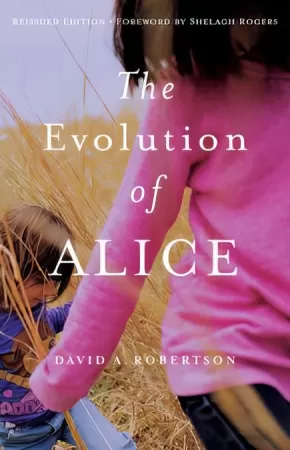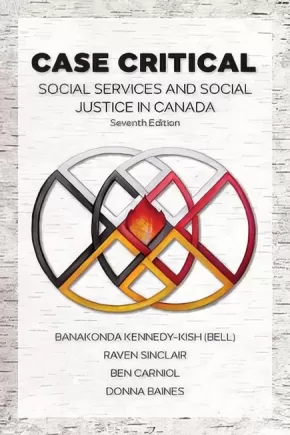Family and Community
Synopsis:
Helen Knott, a highly accomplished Indigenous woman, seems to have it all. But in her memoir, she offers a different perspective. In My Own Moccasins is an unflinching account of addiction, intergenerational trauma, and the wounds brought on by sexual violence. It is also the story of sisterhood, the power of ceremony, the love of family, and the possibility of redemption.
With gripping moments of withdrawal, times of spiritual awareness, and historical insights going back to the signing of Treaty 8 by her great-great grandfather, Chief Bigfoot, her journey exposes the legacy of colonialism, while reclaiming her spirit.
Reviews
"A beautiful rendering of how recovery for our peoples is inevitably about reconnecting with Indigenous identities, lands, cultural and healing practices." —Kim Anderson, author of Reconstructing Native Womenhood
"In My Own Moccasins never flinches. The story goes dark, and then darker. We live in an era where Indigenous women routinely go missing, our youth are killed and disposed of like trash, and the road to justice doesn’t seem to run through the rez. Knott’s journey is familiar, filled with the fallout of residential school, racial injustice, alcoholism, drugs, and despair. But she skillfully draws us along and opens up her life, her family, and her communities to show us a way forward. It’s the best kind of memoir: clear-eyed, generous, and glorious….Bear witness to the emergence of one of the most powerful voices of her generation." —Eden Robinson, author of Son of a Trickster and Monkey Beach (from the foreword)
“Helen Knott speaks truth to the experience of Indigenous women living through the violence of colonized spaces and she does so with grace, beauty and a ferocity that makes me feel so proud.” —Leanne Betasamosake Simpson, author of This Accident of Being Lost
“Helen writes beautifully and painfully, about her own life and the lives of many of our sisters. A strong, gentle voice removing the colonial blanket and exposing truth.” —Maria Campbell, author of Halfbreed
“An incredible debut that documents how trauma and addiction can be turned into healing and love. I am in awe of Helen Knott and her courage. I am a fan for life. Wow.” —Richard Van Camp, author of The Lesser Blessed
“Heartfelt, heartbreaking, triumphant and raw, In My Own Moccasinsis a must-read for anyone who's ever felt lost in their life… Actually, it's a must-read for anyone who appreciates stories of struggle, redemption and healing. Knott’s writing is confident, clear, powerful and inspiring.”—Jowita Bydlowska, author of Guy: A Novel and Drunk Mom
Additional Information
366 pages | 6.00" x 9.00"
Synopsis:
Western theory and practice are over-represented in child welfare services for Indigenous peoples, not the other way around. Contributors to this collection invert the long-held, colonial relationship between Indigenous peoples and systems of child welfare in Canada. By understanding the problem as the prevalence of the Western universe in child welfare services rather than Indigenous peoples, efforts to understand and support Indigenous children and families are fundamentally transformed. Child welfare for Indigenous peoples must be informed and guided by Indigenous practices and understandings. Privileging the iyiniw (First people, people of the land) universe leads to reinvigorating traditional knowledges, practices and ceremonies related to children and families that have existed for centuries.
The chapters of ohpikinâwasowin/Growing a Child describe wisdom-seeking journeys and service-provision changes that occurred in Treaty 6, Treaty 7, and Treaty 8 territory on Turtle Island. Many of the teachings are nehiyaw (Cree) and some are from the Blackfoot people. Taken together, this collection forms a whole related to the Turtle Lodge Teachings, which expresses nehiyaw stages of development, and works to undo the colonial trappings of Canada’s current child welfare system.
Educator Information
Table of Contents
Introduction: Entering the Circle (Leona Makokis, Ralph Bodor, Avery Calhoun, and Stephanie Tyler)
iyiniw tâpwêwin ekwa kiskeyitamowin (Leona Makokis, Ralph Bodor, Avery Calhoun, Stephanie Tyler, Amanda McLellan, Ariel Veldhuisen, Kristina Kopp, Suzanne McLeod, and Sharon Goulet)
miyawata. Family Teachings on Turtle Island (Carolyn Barker)
kayiwatisi. Indigenous Program Indicators (Carol Turner and Ralph Bodor)
ayahpatisi. Practice as Ceremony (Amber Dion, Stephanie Tyler, Christie Pace, and Karen Delver)
tâpwêwin. Foundations of wīcihitāsowin (Angie Pinder and Avery Calhoun)
kîseyihtamowin. miyo ohpikinâwasowin: Igniting Spiritual Fires (Kristina Kopp, Caleb Anacker, Angie Pinder, and Bonda Thompson)
ayawawasowin. pe kīwe Come Home: Indigenous Adoptee Re-Connection with Self, Family and Community (Fran Kuefler Jose and Judy McRee)
kakehtawewin. Bringing Ceremony Home: An Inaugural kiskinohamakewin (Stephanie Tyler and Avery Calhoun)
Conclusion: Closing the Circle
Glossary: English Meaning and Pronunciation of nehiyaw Words
Glossary: English Meaning of nehiyaw Kinship Terms
References
Index
Additional Information
224 pages | 6.00" x 9.00"
Synopsis:
Forty Canadian fathers, from the prime minister to prominent athletes and artists, reflect on their unique parenting challenges and accomplishments.
When Tessa Lloyd’s sons-in-law became fathers, she searched for resources that would help inspire them—especially parenting stories from other fathers. However, that book didn’t seem to exist. As a counsellor for children and families, Lloyd understood the ways a father-child relationship can have a lasting effect through the generations. Seeing a need, Lloyd decided to gather these stories herself.
This resulting volume collects the stories and portraits of forty Canadian fathers who open up about both their own fathers and their deeply personal parenting experiences. This diverse group includes Prime Minister Justin Trudeau, writer Lawrence Hill, academic Niigaan Sinclair, athlete Trevor Linden, restaurateur Vikram Vij, anthropologist Wade Davis, musician Alan Doyle, artist Robert Bateman and philanthropist Rick Hansen. The contributors reflect on their varied parenting experiences and challenges, including parenting while incarcerated, parenting across cultural barriers, parenting through divorce, parenting while transgender, parenting as a celebrity and parenting with a disability. Many common themes emerge throughout the stories, including the process of overcoming cultural messages that encourage men to be strong, authoritarian and emotionally unavailable.
The stories are extraordinarily candid and vulnerable, as the fathers describe their own failings, regrets and childhood traumas, as well as the humbling process of trying to do better. In one anecdote, Dr. Greg Wells describes the experience of meeting another father walking the empty streets at three a.m. with an infant, and how that moment of shared recognition gave him strength at a difficult time. The stories in this book offer a similar glimpse into the shared experiences and trials of fatherhood, but also offer fascinating reflections on the more universal experiences of finding one’s place within a family and striving to be a better person for the sake of others.
Additional Information
320 pages | 6.30" x 9.25" | 80 B&W Photographs
Authenticity Note: This work has received the Authentic Indigenous Text label because of the Indigenous contributions to this work. Not all contributions are from Indigenous people, though. It is up to readers to determine if this work is suitable for their purposes.
Synopsis:
Every object tells a story.
Picking Up the Pieces tells the story of the making of the Witness Blanket, a living work of art conceived and created by Indigenous artist Carey Newman. It includes hundreds of items collected from residential schools across Canada, everything from bricks, photos and letters to hockey skates, dolls and braids. Every object tells a story.
Carey takes the reader on a journey from the initial idea behind the Witness Blanket to the challenges in making it work to its completion. The story is told through the objects and the Survivors who donated them to the project. At every step in this important journey for children and adults alike, Carey is a guide, sharing his process and motivation behind the art. It's a very personal project. Carey's father is a residential school Survivor. Like the Blanket itself, Picking Up the Pieces calls on readers of all ages to bear witness to the residential school experience, a tragic piece of Canada’s history.
"In the traditions of my Salish ancestors, a blanket is gifted to uplight the spirit, protect the vulnerable or honour the strong. I made this blanket for the Survivors, and for the children who never came home; for the dispossessed, the displaced and the forgotten. I made this blanket so that I will never forget -- so that we will never forget." - Carey Newman
Reviews
"Picking Up the Pieces is both a crucial record of history and an outstanding assertion of love and community. The story behind the creation of the powerful Witness Blanket project is one of great care and consideration, with residential school Survivors and their families at the centre. By sharing his own family's connection to a brutal and shameful part of Canadian history, renowned artist Carey Newman brilliantly guides us through the meticulous and thoughtful process of creating one of the most important pieces of art to exist in this country. I had the privilege of experiencing the Witness Blanket on its tour, and it was a poignant moment that will stay with me for the rest of my life. Reading how it all came together is yet another vital experience. Like the Witness Blanket itself, Picking Up the Pieces will educate and enlighten Canadians for generations to come. It's a must-read for anyone seeking to understand Canada's residential-school saga. Most importantly, it's a touchstone of community for those survivors and their families still on the path to healing." — Waubgeshig Rice, journalist and author of Moon of the Crusted Snow, March 2019
Educator Information
Themes: Indigenous Art, Reconciliation, Residential Schools, Survivor Stories, Intergenerational Trauma
Suitable for most ages (about 12 years+). Useful social studies or Indigenous studies resource for pre-teens and teens; however, it does make reference to sexual, emotional, and physical abuse and trauma.
Recommended in the Canadian Indigenous Books for Schools 2019-2020 resource list for grades 11 and 12 and as a teacher resource. Useful for these subjects: English Language Arts, Media Studies, Social Studies.
Additional Information
180 pages | 10.75" x 10.00"
Synopsis:
Andy and Phyllis Chelsea met during their years spent at the St. Joseph’s Mission School in Williams Lake, BC. Like the thousands of others forced into the church-run residential school system, Andy and Phyllis are no strangers to the ongoing difficulties experienced by most Indigenous peoples in Canada. The couple married in 1964 but brought the trauma of their mission school years into their marriage. The Chelseas’ struggle with alcohol came to an abrupt halt in 1971 when their daughter, Ivy, then aged seven, stated that she and her brothers did not want to live with their parents because of the drinking, that they would stay with their Grandmother, their Kye7e. Andy and Phyllis chose sobriety to preserve their family. This decision sparked a lifetime of activism for the couple, which included overcoming the challenges caused by Canada’s disregard for their community. Throughout the twenty-seven years Andy was Chief of the Alkali Lake Esk’et First Nation, the Chelseas worked to eradicate alcoholism and took steps to overcome the rampant intergenerational trauma that existed for the people of Alkali Lake. Their efforts, their story and the perseverance of the members of their village have inspired Indigenous groups facing similar struggles throughout the world.
Resolve: The Chelsea Story and a First Nation Community’s Will to Heal explores the harrowing, personal journey of the Chelseas. By combining personal interviews and historical records, biographer Carolyn Parks Mintz shares the Chelseas’ transition from residential schools to state-sanctioned reservations to international recognition of their activism in the face of ongoing repression. A simultaneous celebration of strength and a condemnation of systemic racism, Resolve is a personal and deeply moving story that calls for a closer look at the status of Canada’s reconciliation efforts from the Chelseas’ perspective.
Educator Information
Recommended in the Canadian Indigenous Books for Schools 2020/2021 resource list for grades 10 to 12 for English Language Arts, Social Studies, and Social Justice.
Caution: Alcoholisms, trauma, physical and sexual abuse.
Additional Information
240 pages | 6.00" x 9.00"
Synopsis:
Here is a voice we have never heard--a voice full of poetry and rage, exploding onto the page with stunning urgency and force.
Here is a story of several people, each of whom has private reasons for travelling to the Big Oakland Powwow. Jacquie Red Feather is newly sober and trying to make it back to the family she left behind in shame. Dene Oxendene is pulling his life together after his uncle's death and has come to work at the powwow to honour his uncle's memory. Opal Viola Victoria Bear Shield has come to watch her nephew Orvil Red Feather, who has taught himself traditional Indian dance through YouTube videos and has come to the powwow to dance in public for the very first time. There will be glorious communion and a spectacle of sacred tradition and pageantry. And there will be sacrifice, and heroism, and unspeakable loss.
Fierce, angry, funny, heartbreaking, There There is a relentlessly paced multi-generational story about violence and recovery, memory and identity, and the beauty and despair woven into the history of a nation and its people. An unforgettable debut.
Reviews
“There There has so much jangling energy and brings so much news from a distinct corner of American life that it’s a revelation… its appearance marks the passing of a generational baton.” —The New York Times
“Each character is introduced and developed with a clear-eyed fidelity, empathic without sentimentality, our understanding increasing as connections are revealed, histories explored, gaps filled in. . . . At its core, There There is a novel about those gaps.” —Toronto Star
“Welcome to a brilliant and generous artist who has already enlarged the landscape of American fiction. There There is a comic vision haunted by profound sadness. Tommy Orange is a new writer with an old heart.” —Louise Erdrich, Birchbark Books
“A gripping deep dive into urban indigenous community in California: an astonishing literary debut!” —Margaret Atwood via Twitter
“There There is a miraculous achievement, a book that wields ferocious honesty and originality in service of telling a story that needs to be told. This is a novel about what it means to inhabit a land both yours and stolen from you, to simultaneously contend with the weight of belonging and unbelonging. There is an organic power to this book—a revelatory, controlled chaos. Tommy Orange writes the way a storm makes landfall.” —Omar El Akkad, author of American War
Educator Information
ERAC approved title for grades 11 and 12 literature circles around identity, overcoming adversity, or how the past shapes our lives. Social considerations noted; recommended for mature students.
Additional Information
304 pages | 5.64" x 8.51" | Paperback
Synopsis:
Activating the Heart is an exploration of storytelling as a tool for knowledge production and sharing to build new connections between people and their histories, environments, and cultural geographies. The collection pays particular attention to the significance of storytelling in Indigenous knowledge frameworks and extends into other ways of knowing in works where scholars have embraced narrative and story as a part of their research approach.
In the first section, Storytelling to Understand, authors draw on both theoretical and empirical work to examine storytelling as a way of knowing. In the second section, Storytelling to Share, authors demonstrate the power of stories to share knowledge and convey significant lessons, as well as to engage different audiences in knowledge exchange. The third section, Storytelling to Create, contains three poems and a short story that engage with storytelling as a means to produce or create knowledge, particularly through explorations of relationship to place.
The result is an interdisciplinary and cross-cultural dialogue that yields important insights in terms of qualitative research methods, language and literacy, policy-making, human–environment relationships, and healing. This book is intended for scholars, artists, activists, policymakers, and practitioners who are interested in storytelling as a method for teaching, cross-cultural understanding, community engagement, and knowledge exchange.
Educator Information
This book would be useful for the following subjects: Indigenous Studies, Literary Criticism, Creative Writing, and Social Science.
Recommended in the Canadian Indigenous Books for Schools 2019-2020 resource list as being useful for grades 11-12 for English Language Arts and Social Studies.
Additional Information
220 pages | 6.00" x 9.00"
Edited by Julia Christensen, Christopher Cox and Lisa Szabo-Jones.
Authenticity Note: Contributors to this work identify with various First Nations and Metis communities. Therefore, the Authentic Indigenous Text label has been applied. It is up to readers to determine if this will work as an authentic resource for their purposes.
Synopsis:
Family Walks and Hikes is an exciting new series of books written specifically for outdoor enthusiasts of all ages and abilities. These accurate, attractive guides feature expertly curated routes, informative maps and colour photographs.
The first book in this highly anticipated new series assembles an impressive variety of walks and hikes for visitors and locals looking for unique, guided wanderings in the area between Victoria and Nanaimo, including:
- Millstone Falls
- Westwood Lake
- Colliery Dam Park
- Nanaimo River
- Yellow Point Park
- Chemainus Lake
- Mount Tzouhalem
- Spectacle Lake Provincial Park
- Niagara Falls and Goldstream Trestle Bridge
- Tod Inlet
- Mount Work
- Beaver Lake
- Mount Douglas
- Devonian Park
- Avatar Grove
- Lizard Lake
Ranging from charmingly easy to moderately challenging, these hikes are all accessible from reliable roads and popular staging areas. In addition, each hike is accompanied by a clear, colourful map, step by step directions and full-colour photographs.
Each route includes:
- detailed directions to trailheads
- colour maps and photographs
- seasonal information
- round-trip distances
- trail commentary
- difficulty ratings
Additional Information
192 pages | 5.50" x 8.50"
Synopsis:
A powerful story of resilience—a must-read for all Canadians.
Growing up in the tiny village of Smith, Alberta, Darrel J. McLeod was surrounded by his Cree family’s history. In shifting and unpredictable stories, his mother, Bertha, shared narratives of their culture, their family and the cruelty that she and her sisters endured in residential school. McLeod was comforted by her presence and that of his many siblings and cousins, the smells of moose stew and wild peppermint tea, and his deep love of the landscape. Bertha taught him to be fiercely proud of his heritage and to listen to the birds that would return to watch over and guide him at key junctures of his life.
However, in a spiral of events, Darrel’s mother turned wild and unstable, and their home life became chaotic. Sweet and innocent by nature, Darrel struggled to maintain his grades and pursue an interest in music while changing homes many times, witnessing violence, caring for his younger siblings and suffering abuse at the hands of his surrogate father. Meanwhile, his sibling’s gender transition provoked Darrel to deeply question his own sexual identity.
The fractured narrative of Mamaskatch mirrors Bertha’s attempts to reckon with the trauma and abuse she faced in her own life, and captures an intensely moving portrait of a family of strong personalities, deep ties and the shared history that both binds and haunts them.
Beautifully written, honest and thought-provoking, Mamaskatch—named for the Cree word used as a response to dreams shared—is ultimately an uplifting account of overcoming personal and societal obstacles. In spite of the traumas of Darrel’s childhood, deep and mysterious forces handed down by his mother helped him survive and thrive: her love and strength stayed with him to build the foundation of what would come to be a very fulfilling and adventurous life.
Reviews
“Honestly stunning. McLeod’s clear writing lays bare his complicated ties to his family, his lovers and his country in a memoir that moved and haunted me. If you loved Maria Campbell’s Halfbreed, you will love Mamaskatch.” — Eden Robinson, author of Son of a Trickster and Monkey Beach
“Reading the text was like diving into the eternity of dreams and being paralyzed by a nightmare. However, there is sunrise. Told candidly and with heartbreaking honesty, McLeod’s memoir shows how survival beckoned and he held on to the spirit of his ancestors—the love that no one can ever sever. He lives for all of us. — Louise Bernice Halfe, author of Burning in this Midnight Dream
“A compelling read that shows the heartbreaking results of imposed oppression. Darrel has identity problems of many kinds and the result is a life full of chaos. The gradual climb out of that dark place is touching.” — Bev Sellars, former councillor and chief of the Xat’sull First Nation and author of Price Paid.
“Mamaskatch is a profound and tender love song, an elegy to a wounded family, and an unsparing, exquisitely moving chronicle of growing up “Nehiyaw” (Cree). Like the birdsong his mother taught him to understand, McLeod’s voice is magical; it will lift and carry you through bone-breaking grief with grit, optimism and wry, life-saving humour. You will not leave this book unchanged.” — Denise Ryan, journalist, Vancouver Sun
"Darrel McLeod’s Mamaskatch is a heart-wrenching mîwâsin memoir full of vignettes that are so intricately woven that they guide you through with grace, sâkihiwêwin, humour, and maskihkîy. This is a narrative built through continuums that detail the lives of the McLeod family through their queer travails, trans realities, bannock and stew conversations, and a plethora of intergenerational traumas and triumphs. I can feel the warm embrace of the Three Sisters wrapping around me as I read this, that heart-drum beat resounding beneath its literary cadences, the frigidity of the Athabasca kissing my heels, and a narrator who teaches me from his very first passage in this novel that a good story is a medicine song that re-members and re-animates, in true nehiyawewin fashion, those who have paved the way for us and those who for whom we pave. Ay-hay, Darrel, for this lovely work that lulls me back into those old-fashioned country songs that nearly every prairie kokôm raised us on. Mâmaskâc!" — Joshua Whitehead, author of Full-Metal Indigiqueer and Jonny Appleseed
Additional Information
240 pages | 6.00" x 9.00"
Synopsis:
The Rumour is a collection of poetry that exposes many important issues of Indigenous discrimination, poverty, drug abuse, brutal violence, love, family, and complex human relationships. As a skilled painter, Joseph A. Dandurand portrays the essence of strong connections with rich Indigenous history, culture, traditions, and family values with broad but precise strokes. The poems come from author's lifetime experience living on the Kwantlen First Nation reserve and give a true picture of the resilience and the struggles Indigenous people experience in everyday life.
Educator & Series Information
This book is part of the Modern Indigenous Voices series.
Additional Information
96 pages | 5.50" x 8.50"
Synopsis:
What is family? Is it defined by blood and birth? Or can we invite whomever we want into that intimate embrace?
The Language of Family: Stories of Bonds and Belonging invites readers to pull up a guest chair at the family table.
Twenty contributors from across British Columbia -- museum curators, cultural luminaries, writers and thinkers young and old, from First Nations, LGBTQ, Japanese Canadian and Punjabi communities, among others -- share their vastly different perspectives on what family means in this superb collection of personal narratives, poems and essays.
This collection will provoke, tease, enlighten and infuriate. Isn't that what family does best?
Stories, poems and essays by Sadhu Binning, Martha Black, Don Bourdon, Kathryn Bridge, Tzu-I Chung, Shushma Datt, Mo Dhaliwal, Zoé Duhaime, barbara findlay, Lynn Greenhough, Judith I. Guichon, Lorne F. Hammond, Joy Kogawa, Patrick Lane, Jack Lohman, Luke Marston, Bev Sellars, Monique Gray Smith, Ann-Bernice Thomas and Larry Wong.
Educator Information
Some Indigenous content.
Additional Information
250 pages | 8.50" x 9.49"
Authenticity Note: This book contains contributions from Indigenous writers, which is why it has received the Authentic Indigenous Text label. There are, however, many other contributors who are not Indigenous whose works are also included.
Synopsis:
This haunting, emotionally resonant story delivers us into the world of Alice, a single mother raising her three young daughters on the rez where she grew up. Alice has never had an easy life, but has managed to get by with the support of her best friend, Gideon, and her family. When an unthinkable loss occurs, Alice is forced onto a different path, one that will challenge her belief in herself and the world she thought she knew. The Evolution of Alice is the kaleidoscopic story of one woman’s place within the web of community. Peopled with unforgettable characters and told from multiple points of view, this is a novel where spirits are alive, forgiveness is possible, and love is the only thing that matters.
Reviews
"So many Manitobans have, like a character in an early chapter, only sped by reserves on the highway. Inviting us into a rich community of characters, which stretches deeper than the headlines most of us associate with reserve life, Robertson is doing a service to everyone who calls Manitoba home. And crafting an engaging story of one family’s recovery from loss — at a time when indigenous peoples are increasingly flexing political, economic and cultural muscle in this country — is a gift for everyone hoping for a better future for our divided country…" - Matthew TenBruggencate, CTV Winnipeg
"Pulsing at the heart of this novel are the warmly rendered inflections of storytelling voices like Gideon’s, at once reflective, vivid, and vernacular. And at the novel’s core, the broken but ultimately healing rhythms of Alice’s 'evolution' – her cycles of loving and suffering, of her family’s living, dying, and ultimately hoping to live anew — bring contemporary experience on the reservation and in the big city achingly, joyfully, and always pungently alive." - Neil Besner, Professor of English, Provost and Vice-President, Academic, The University of Winnipeg
Educator Information
Grades 10-12 English First Peoples.
This 2nd edition has been reissued with a new story by David A. Robertson and foreword by Shelagh Rogers.
Additional Information
216 pages | 5.50" x 8.50" | 2nd Edition
Synopsis:
It is a day like any other when seventeen-year-old Melinda Jensen hits the road for San Francisco, leaving behind her fractured home life and a constant assault on her self-esteem. Henry is the handsome, charismatic man who comes upon her, collapsed on a park bench, and offers love, a bright new consciousness, and—best of all—a family. One that will embrace her and give her love. Because family is what Mel has never really had. And this new family, Henry’s family, shares everything. They share the chores, their bodies, and their beliefs. And if Mel truly wants to belong, she will share in everything they do. No matter what the family does, or how far they go.
Told in episodic verse, family is a fictionalized exploration of cult dynamics, loosely based on the Manson Family murders of 1969. It is an unflinching look at people who are born broken, and the lengths they’ll go to to make themselves “whole” again.
Synopsis:
The adoption of Aboriginal children into non-Aboriginal families has a long and contentious history in Canada. Life stories told by First Nations people reveal that the adoption experience has been far from positive for these communities and has, in fact, been an integral aspect of colonization. In an effort to decolonize adoption practices, the Yellowhead Tribal Services Agency (YTSA) in Alberta has integrated customary First Peoples’ adoption practices with provincial adoption laws and regulations. Introducing this unique agency, the authors outline the history of First Nations adoptions and, through an interview with a YTSA Elder, describe the adoption ceremonies offered at YTSA. Themes that emerged from interviews with adoptive parents and youth who have been adopted through this new integrated practice are also explored, and important recommendations for policy and practice in First Nations adoption are offered.
Synopsis:
Incorporating the critical perspectives, emphasis on diversity, and pointed suggestions for change that made the previous editions into bestsellers, Ben Carniol pulls together today’s most pertinent research, critical analysis, and practice examples and presents them in this accessible and useful sixth edition of Case Critical.
In the context of the current economic and political climate, this new edition discusses First Nations issues, the increasing corporatization of service, and the explicit link between social work practice and social movements. Carniol questions illegitimate privilege created by colonialism, racism, patriarchal capitalism, heterosexism, ableism and ageism; posing many key questions. Such as, why, as social work education develops progressive approaches, are so many social services deteriorating? How can social workers become allies with diverse groups of people? And, why do progressives persist in their work?
Carniol, a long-time social work educator and social justice activist, offers his own analysis of social work in Canada today in this provocative and ultimately hopeful sixth edition.
Additional information
200 pages | 6.00" x 9.00"

